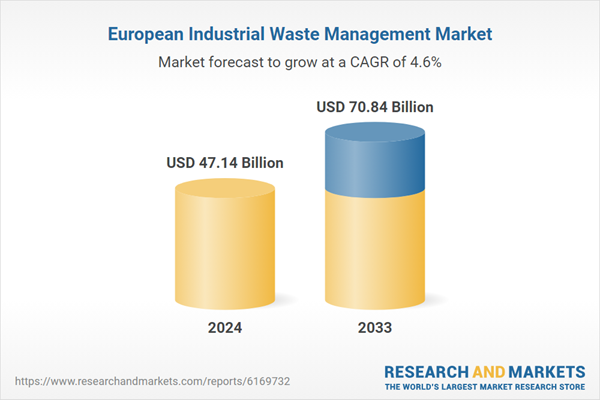Company Logo
The Europe Industrial Waste Management Market is poised to reach $70.84 billion by 2033, growing at a 4.63% CAGR from 2025, driven by stringent EU regulations and increased demand for sustainable solutions. The market, segmented by waste type, disposal method, and ownership, is witnessing substantial growth in waste processing technologies across manufacturing, energy, and construction sectors. Key regulatory frameworks like the Waste Framework Directive further boost market expansion by encouraging environmentally friendly practices. Investments are surging in recycling and waste-to-energy innovations, with companies like Veolia and member states prioritizing sustainability. Despite challenges like high operational costs and varied regional laws, Europe remains a leader in advancing industrial waste management towards a circular economy model.
European Industrial Waste Management Market
European Industrial Waste Management Market
Dublin, Sept. 26, 2025 (GLOBE NEWSWIRE) — The “Europe Industrial Waste Management Market Report by Waste Type, Disposal Methods, Type of Ownership, Country and Company Analysis, 2025-2033” report has been added to ResearchAndMarkets.com’s offering.
Europe Industrial Waste Management Market is expected to reach US$ 70.84 billion by 2033 from US$ 47.14 billion in 2024, with a CAGR of 4.63% from 2025 to 2033.
One of the main factors propelling the expansion of the European industrial waste management market is the growing regulatory pressure from the EU and its member states. Additionally, businesses are being compelled to look for effective waste management solutions due to growing public awareness and demand for corporate sustainability.
The market for industrial waste management is dominated by Western Europe because of its robust infrastructure and regulations, but demand is growing in Eastern Europe as a result of contemporary waste handling systems and faster industrial expansion.
The industry for industrial waste management in Europe is going through a revolutionary stage as businesses all over the continent adopt more sustainable practices and stringent environmental regulations. The market offers a wide range of services for industries like manufacturing, energy, construction, and chemicals, including waste collection, treatment, recycling, and disposal. Both governmental and commercial organizations are investing in cutting-edge waste processing technologies as a result of growing concerns about resource conservation and environmental preservation.
The industry landscape is largely shaped by national laws and European Union directives. Waste minimization and reuse are encouraged by policies like the Waste Framework Directive and the Circular Economy Action Plan, which push companies to employ more environmentally friendly waste management techniques. As a result, there is a greater need for specialized service providers who can handle both hazardous and non-hazardous industrial waste while adhering to environmental regulations. Furthermore, waste-to-energy technology innovation is becoming more popular as a way to generate energy and reduce trash.
The European industrial waste management sector is being driven by rising public awareness and a need for environmentally friendly solutions. Growing environmental concerns are forcing firms to embrace sustainable practices, which is driving up investment in innovative waste management technologies. This change not only satisfies legal requirements but also aligns with consumer demands for corporate social responsibility, making the market for eco-friendly waste management solutions more competitive.
The European Commission has revealed a €10 billion investment plan in October 2023 with the goal of improving waste management infrastructure in all member states, with an emphasis on recycling and waste-to-energy initiatives. Furthermore, in September 2023, Veolia, a prominent waste management company, announced intentions to invest €2 billion in growing its business in Germany. The company aims to use cutting-edge recycling technologies to enhance resource recovery and lessen reliance on landfills. These actions demonstrate Europe’s strong commitment to environmentally friendly trash management.
Alongside Western Europe’s modernization initiatives, Eastern Europe’s growing industrial production and urbanization are also propelling the market. Market capacities are being strengthened by infrastructure expenditures, digital waste stream tracking, and public-private collaborations. Nevertheless, there are still issues, such as expensive operating expenses, different national laws, and intricate waste classification schemes. Notwithstanding these challenges, Europe continues to lead the world in environmentally friendly industrial waste management, and sustained expansion is anticipated through cross-border cooperation and technology integration.
Key Factors Driving the Europe Industrial Waste Management Market Growth
Story Continues
